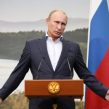
Putin Emphasizes Progress in Chechnya
Publication: North Caucasus Weekly Volume: 9 Issue: 22

In his May 31 interview with Le Monde, Prime Minister Vladimir Putin not only expressed no regrets about the way the Moscow theater siege and Beslan hostage crisis were handled, but spoke about the situation in Chechnya and the North Caucasus more generally. Here, too, he accentuated the positive.
“The situation in the Chechen Republic has improved, and it improved because of several circumstances, the main one being the fact that the Chechen people have made a certain choice for themselves towards the development of their republic within the Russian Federation,” the RussiaToday website quoted Putin as telling the French newspaper. “We saw the reaction of the Chechen people to attempts to penetrate the consciousness of the local population with forms of Islam that are not traditional for them. This is what it all started with. Wahhabism in its primordial form is a normal current of Islam, there is nothing terrible in it. But there are extremist trends within the framework of Wahhabism itself. It was precisely these currents that attempted to penetrate the consciousness of the Chechen people. And the people realized that someone from outside was fighting not for their interests, but trying to use people as a tool to loosen the Russian Federation as a major and significant player on the international arena, and that would bring only suffering to the people. The awareness of this factor was the main thing, in terms of stabilization. This was what it started with.”
Putin said that once it was clear that the attitude of the Chechen people had changed, he and his administration handed over the bulk of responsibilities, both in law-enforcement and the economy, to the Chechen authorities. “It seemed impossible that a defense minister in the government led by [Aslan] Maskhadov could become a member of today’s Chechen parliament,” Putin said, referring to Magomed Khanbiev, the former Chechen Republic of Ichkeria (ChRI) Defense Minister and general of the ChRI armed forces who is now a deputy in Chechnya’s parliament (Chechnya Weekly, May 29). “Now it’s a fact. And it has created the necessary political conditions for the reconstruction of Grozny and for immediate steps in the economy.”
Putin did address the issue of human rights in Chechnya, insisting that rule of law is operating in the republic. “I can tell you that courts and the prosecutor’s office is actively working in the Chechen Republic, and investigations are carried out,” he said. “Suspects are made accountable for any crimes committed, disregarding their motives or previous posts or jobs. Even concerning former rebels and Russian servicemen. Criminal prosecution is possible not only in the future but now. We have completed trials against a number of people who are convicted while serving as Russian officers, they are now in prison. I should say it was a hard decision for our courts, because despite their apparent crimes, a court jury acquitted them on more than one occasion. It shows trends in Russian society. Especially after the atrocities done to our citizens by terrorists. I’m personally certain that if we want to bring order and peace, we mustn’t let anyone contravene the law.” It is worth noting that in his interview with Le Monde, Putin did not mention Chechen President Ramzan Kadyrov.
Putin also played down the upsurge in violence in Ingushetia and Dagestan. “As far as Dagestan and Ingushetia are concerned, we see and are well aware of what is going on there—there are indeed disputes and conflicts of interest, but it is not about political interests, but first and foremost, economic, as well as some political conflicts, but not related to any separatist movements—it is about an internal political struggle within the republics themselves,” RussiaToday quoted him as telling Le Monde.
Putin told the French newspaper that the main priority for the North Caucasus is rebuilding the social and economic sectors. “Many people live below the poverty line there, most suffering from unemployment, which is particularly bad among young people,” he said. “So we have adopted a Program of Development for Southern Russia, which above all concerns the North Caucasus republics. This program envisages huge investments into the economy and the social sector as a priority. I count on it to be fulfilled successfully.”




